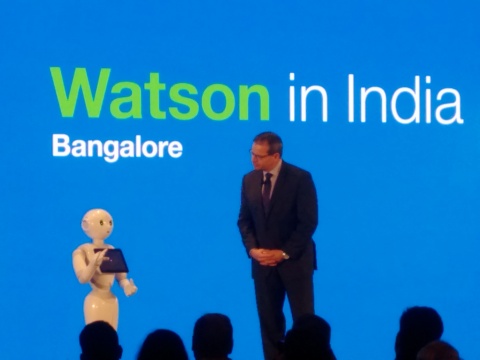-
Prasanto K Roy
03rd Feb 2016
IBM is bringing Watson, its cognitive “question answering” supercomputer system, to India, with a Bangalore-based hospital as its first user.
Announcing this in Bangalore on Tuesday evening, IBM chairman and CEO Ginni Rometty said cognitive computing was very big for IBM, and “will run through all of what we do, and all delivered through the cloud.” “The cognitive era will be the most transformative,” she said, “and it will be the most disruptive, with India at the forefront.”
Watson is versatile, powering game shows, cancer care, and even Pepper the Robot (see photo) who came on stage to explain how Watson, back in the cloud, makes him tick.
In Manipal Hospital’s Oncology department, Watson will help make decisions about cancer care and treatment. It will draw on its previous ‘knowledge’ of cancer cases, trawling through vast amounts of medical data to arrive at diagnosis and advise treatment. It will also learn from every case that is fed into it. Watson’s been learning oncology for a while, mainly at Memorial Sloan-Kettering Cancer Center in the USA, but also learning from being deployed at over a dozen hospitals in North America for the past two years.
In a chat with Rometty, Ajay Bakshi, managing director and CEO of Manipal Health Enterprises, said that India has an epidemic of cancer—“too many patients, too few oncologists”. “Oncologists have no time to manage the patients, let alone read up on thousands of research papers a month,” he said. “Now we have this Watson, this humble genius assistant that keeps learning, doesn't sleep. We've hired a very expensive consultant, but I believe it will more than pay for itself in better patient care.”
Watson, named after IBM’s first CEO, Thomas J Watson, was designed as a learning system that could answer questions posed in natural language, as part of IBM’s DeepQA project. It was in fact was developed to participate in the quiz show Jeopardy in 2011. It managed to beat the reigning champions, and got the first price of $1 million. IBM’s been there before, building supercomputers for contests. In 1996, its Deep Blue beat world champion Garry Kasparov in one game, and then in 1997 repeated it, becoming the first computer system to defeat a reigning world champion.
Watson isn’t a physical computer, at least not for the typical business customer. Customers like Manipal interacts with a cloud based system. At the back end, Watson’s hardware uses massively parallel, 3.5 GHz eight-core Power7 processors, with four threads per core. A cluster of ninety IBM Power 750 servers adds up to 2,880 Power7 processor threads and 16 terabytes of RAM.
LEARNING: GAME SHOWS TO CANCER CARE
Nor is Watson among the most powerful supercomputers out there in terms of raw power. Its Linpack performance is 80 TeraFLOP/s, keeping it out of the Top 500 Supercomputers. But it can process a whopping 500 gigabytes every second, and has lots of memory. Watson was kept offline from the Internet during its famous record-setting Jeopardy win, but it had 200 million pages of content, about 4 terabytes, stored entirely in RAM—including the full text of Wikipedia at that time.
What Watson excels in is learning, and answering questions in natural, human language. It converts these questions into structured queries in real time, following rules of grammar and learning and refining context along the way.
How does it go from there to advanced medical science and oncology? Well, it turns out the idea is the same as in a quiz game: gather a knowledge base and keep adding to it, and answer questions correctly.
In fact, none of the restrictions of the game show—the system being offline, for instance, and a 60-second time limit—apply in real life applications, and it multiplies Watson’s power to be always online, adding to its knowledge base—for instance, from 15 hospitals across the world.

Pepper the Robot explains how Watson makes him tick--over the cloud
As of now, IBM has announced one customer in India, Manipal Hospitals, and says it’s “talking to many others”. It doesn’t give details, but likely areas would be, outside medicine, e-commerce and retail (where Rometty says it’s a “game changer”), oil and gas, and weather. IBM’s acquisition of the Weather Company, late last year became its foundation for the Watson IoT Unit, headquartered in Munich, Germany.
The author was hosted by IBM, who paid for travel and stay at Bangalore
IBM Brings Watson to India | TechTree.com
IBM Brings Watson to India
Cognitive computing a game changer in cancer-care, commerce and other areas, says IBM chief Ginni Rometty in Bangalore
News Corner
- DRIFE Begins Operations in Namma Bengaluru
- Sevenaire launches ‘NEPTUNE’ – 24W Portable Speaker with RGB LED Lights
- Inbase launches ‘Urban Q1 Pro’ TWS Earbuds with Smart Touch control in India
- Airtel announces Rs 6000 cashback on purchase of smartphones from leading brands
- 78% of Indians are saving to spend during the festive season and 72% will splurge on gadgets & electronics
- 5 Tips For Buying A TV This Festive Season
- Facebook launches its largest creator education program in India
- 5 educational tech toys for young and aspiring engineers
- Mid-range smartphones emerge as customer favourites this festive season, reveals Amazon survey
- COLORFUL Launches Onebot M24A1 AIO PC for Professionals







TECHTREE